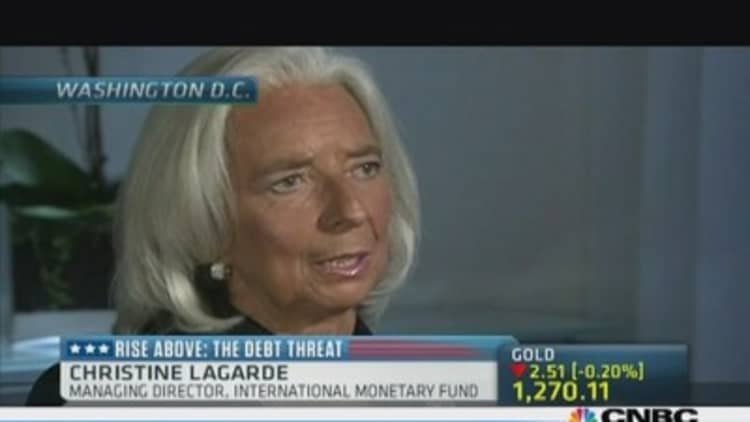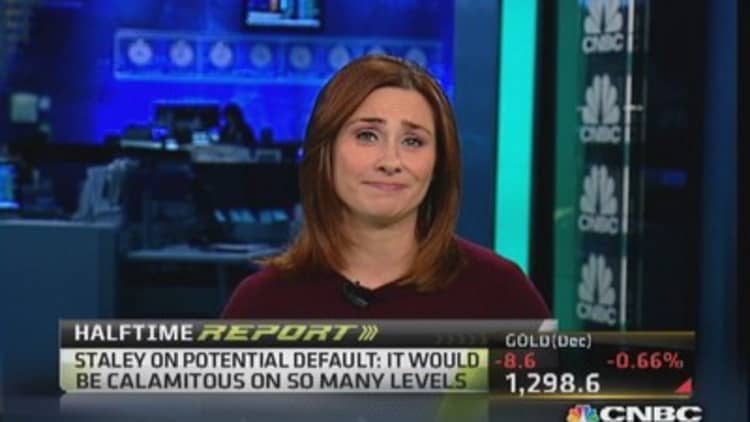
The chief of the International Monetary Fund, Christine Lagarde, weighed in on the U.S. debt ceiling dilemma, warning that 'creative accounting' would not be the solution.
Lagarde's comments come as the U.S. government approached its 14th day of a shutdown on Monday, four days away from breaching the October 17 deadline to raise the debt ceiling, which many worry could lead to a potential debt default for the world's largest economy.
Last week, Republican Party Senator Rand Paul dismissed the fuss over a potential default, according to media reports, arguing the risk was overstated because the government collects enough taxes to finance the interest on the debt.
(Read more: US days away from 'dangerous' moment: World Bank)
However, Lagarde told NBC's Meet the Press that such measures would not help matters.
"It's very, very concerning," said Lagarde, referring to the risk of a U.S. debt default. "But creative accounting is not the solution and markets know that."
"When you are the largest economy in the world, when you are the safe haven in all circumstances, as has been the case, you can't go into that creative accounting business," she added, referring to accounting practices that deviate from the principles of standard accounting practices.
(Read more: Here are 7 default doomsday scenarios)
The U.S. government actually hit its debt limit of $16.7 trillion in May, but has been juggling its finances to avoid going over the limit since. Lagarde told NBC's David Gregory that the U.S. has an obligation to the rest of the world to provide certainty and preserve its safe haven status.
"You have to honor your signature... and you have to make sure that your own economy is consolidating.... because it impacts the entire [global] economy," she said.
A great deal of focus has been on the U.S. this year as signs of a tentative recovery have encouraged investors worldwide, while simultaneously raising fears over the Fed's plans to wind down its aggressive monetary easing program.

Lagarde said her advice to U.S. policy makers was to "hurry up, but slow down."
(Read more: How safe is your money if the US defaults?)
"'Hurry up,' because measures have to be taken now to deal with entitlements, because there is a lot of entitlement coming up," she said in reference to the government's public spending on healthcare and social security, which many argue need to be cut aggressively if the U.S. is going to address its debt issues.
But Lagarde said it was important that these cuts are handled carefully.
"But we say, 'slow down,' because the point is not to contract the economy by slashing spending brutally now, as recovery is picking up. So the pace of consolidation has to be sensible in order to protect that growth which is generating jobs, and which is helping in all sorts of ways," she added.
The IMF chief also said she was encouraged by the improvement in the U.S. economy, especially in the housing and the auto industries, in combination with the progress banks, corporations and households have made in terms of de-leveraging.
(Read more: Dollar's role as reserve currency at risk: ECB's Nowotny)
"It's a much healthier economy than it was, obviously, back in 2008-2009. A lot of work has been done. And the economy is, I'm almost about to say, 'was,' but I hope 'is' really on its way to recovery," she added.
U.S. gross domestic product rose 1.8 percent in the first quarter on this year, and 2.5 percent in the second quarter, on an annualized basis, up from a 0.1 percent contraction in the final quarter of 2012.
— By CNBC's Katie Holliday: Follow her on Twitter @hollidaykatie


